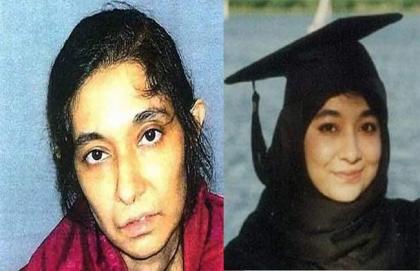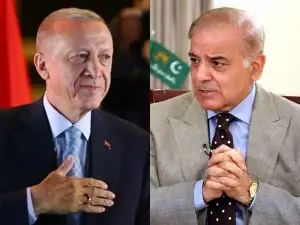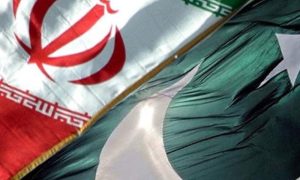Dr Aafia Siddiqui
Pakistani neuroscientist Dr Aafia Siddiqui has been languishing in an American prison for nearly 20 years on terrorism charges. She was among the Pakistanis accused of having links with Al Qaeda and was later arrested and detained in the United States. She was convicted of attempting to shoot a group of US soldiers in Afghanistan in 2010. Currently, she is serving an 86-year sentence at a US federal prison in Fort Worth, Texas.
Aafia Siddiqui was born on March 2, 1972, in Karachi to a Sunni Muslim family. Her parents were a Pakistani middle-class family with a strong faith in Islam and education. Her father, Mohammad Salay Siddiqui, was a doctor, and her mother, Ismet, was said to be a confidante of General Zia ul-Haq.
Dr Aafia was an impassioned Muslim activist. In Boston, she campaigned for Afghanistan, Bosnia and Chechnya; she was particularly affected by graphic videos of pregnant Bosnian women being killed. She wrote emails, held fundraisers and made forceful speeches at her local mosque. But the charities she worked with had sharp edges and were banned in the US later.
Dr Aafia was a smart teenager who followed her elder brother to the US in 1990. Her impressive grades won her admission to the prestigious Massachusetts Institute of Technology (MIT) and later Brandeis University, where she graduated in cognitive neuroscience. She completed her studies in the United States and finally obtained a PhD in neuroscience from Brandeis University in 2001.
After spending two years abroad, she returned to Pakistan for the first time after the 9/11 attacks in 2001. Within two years, she returned to her native land again in 2003 during the war in Afghanistan. Various reports speculated about Dr Aafia’s whereabouts after her return to Pakistan in 2003. Some investigative reporters claimed that she served as a courier and financier for Al Qaeda’s Khalid Sheikh Muhammad. She was the only woman to be listed in the Federal Bureau of Investigation’s records.
Earlier in 1995, Dr Aafia married a young Karachi doctor, Amjad Khan. A year later, their first child, Ahmed, was born. She has three kids with Amjad Khan. It is also reported and speculated that she later married Ammar al-Baluchi, a nephew of the 9/11 mastermind Khalid Sheikh Mohammed, after a divorce from Amajd Khan. Siddiqui’s family denied the report, but it was confirmed by Pakistani and US intelligence, al-Baluchi’s relatives and Siddiqui herself.
Probably, this was the time when her three kids were kidnapped in Pakistan. It is believed that after five years, she reappeared in Ghazni, Afghanistan. This was the most vital time when Afghan Police arrested her and held her for questioning by the FBI. Initially, it was presumed that Dr Aafia Siddiqui had been picked up by Pakistan’s Inter-Service Intelligence (ISI) at the behest of the CIA. The theory seemed to be confirmed by American media reports that Siddiqui’s name had been given by Mohammed, the 9/11 instigator, who was captured three weeks earlier.
Yvonne Ridley, the British journalist turned Muslim campaigner, reported that Dr Aafia Siddiqui spent the missing five years at the dreaded Bagram detention centre north of Kabul.
The story of Dr Aafia Siddiqui became lime lighted with her own statement when she denied all allegations levelled against her. She allegedly told the FBI that she had gone into hiding but later disavowed her testimony and stated she had been abducted and imprisoned. Contrarily, all her well-wishers and supporters think that she was held captive at Bagram Air Force Base as a ghost prisoner. During her custody, the FBI illustrated that she allegedly shot at visiting US FBI and Army personnel with an M4 carbine one of the interrogators had placed on the floor by his feet. She was shot in the trunk when a warrant officer returned fire. In fact, US authorities claimed that she was hospitalized and treated after this attempted attack. Later, she was deported to the US for a final trial.
In September 2008, she was indicted on charges of assault and attempted murder of a US soldier in the police station in Ghazni, but she categorically denied all charges levelled against her. Finally, she was convicted on February 3 2010, for her attempted murder and later sentenced to 86 years in prison.
Her sentencing sparked a heavy public outrage in Pakistan. The masses saw her as a victim of the US criminal justice system. Religious parties and their supporters staged demonstrations and rallies against the United States. Newspapers wrote about her “torture”, parliament passed resolutions, placard-waving demonstrators pounded the streets, and the government spent $2 million on a top-flight defence.
Gaining support at the national and international levels, Taliban leader Hakimullah Mehsud, who affectionately called Siddiqui a “sister in Islam”, and Imran Khan supported her on a number of occasions.
The government of Nawaz Sharif, three-time former prime minister and elder brother of incumbent PM Shehbaz Sharif, also made efforts for Siddiqui’s release during his tenure. Recently, Prime Minister Shehbaz Sharif directed the Foreign Office to engage with the US authorities for the release of Aafia Siddiqui.
Later, Dr Fowzia, the sister of Dr Aafia, appreciated the measures the government was taking for Dr Aafia’s well-being and requested the Government of Pakistan to redouble its efforts for her early release. Eventually, Dr Fawzia had an emotional reunion with her sister on May 31 after two decades of separation.
Pakistani Senator Mushtaq Ahmad Khan, who accompanied Dr Fowzia to the US, spoke about Dr Aafia’s ordeal in prison. He said that her health had deteriorated in captivity, adding that she had developed hearing problems due to an injury to her head.
Who is Dr Aafia Siddiqui?
Pakistani neuroscientist Dr Aafia Siddiqui has been languishing in an American prison for nearly 20 years on terrorism charges. She was among the Pakistanis accused of having links with Al Qaeda and was later arrested and detained in the United States.
Dr Aafia Siddiqui father
Aafia’s father was Mohammad Salay Siddiqui, who was a physician by profession.
Dr Aafia Siddiqui mother
Ismat Siddiqui was the mother of Pakistani neuroscientist Dr Aafia Siddiqui who passed away in 2022, she was laid to rest at a local cemetery in Karachi.
Dr Aafia Siddiqui Husband
Dr Aafia married twice, she first tied the knot with Amjad Mohammed Khan, a former anesthesiologist at Boston’s Brigham and Women’s Hospital, she later married Ali Abd al-Aziz Ali aka Ammar al-Baluchi.
Dr Aafia Siddiqui children
Siddiqui gave birth to her first son, Muhammad Ahmed, in 1996, and to a daughter, Mariam Bint-e Muhammad, in 1998.
Dr Aafia Siddiqui sister
Dr Fauzia Siddiqui is the sister of Aafia, the siblings meet in June 2023 after 20 years.
The Pakistani neuroscientist jailed in the United States for over a decade — finally met her younger sister Dr Fauzia Siddiqu
Dr Aafia was an impassioned Muslim activist. In Boston, she campaigned for Afghanistan, Bosnia and Chechnya; she was particularly affected by graphic videos of pregnant Bosnian women being killed. She wrote emails, held fundraisers, and made forceful speeches at her local mosque. But the charities she worked with had sharp edges and were banned in the US later.
Where is Aafia Siddiqui
She was convicted of attempting to shoot a group of US soldiers in Afghanistan in 2010. Currently, she is serving an 86-year sentence at a US federal prison in Fort Worth, Texas.
Aafia Siddiqui was born on March 2, 1972, in Karachi to a Sunni Muslim family. Her parents were a Pakistani middle-class family with a strong faith in Islam and education.
Dr Aafia Siddiqui education
Dr Aafia was a smart teenager who followed her elder brother to the US in 1990. Her impressive grades won her admission to the prestigious Massachusetts Institute of Technology (MIT) and later Brandeis University, where she graduated in cognitive neuroscience. She completed her studies in the United States and finally obtained a Ph.D. in neuroscience from Brandeis University 2001.
After spending two years abroad, she returned to Pakistan for first time after the9/11 attacks in 2001. Within two years, she returned to her native land again in 2003 during the war in Afghanistan. Various reports speculated about DrAafia’swhereabout after her return to Pakistan in 2003. Some investigative reporters claimed that she served as a courier and financier for AlQaeda’s Khalid Sheikh Muhammad. She was the only woman to be listed in the Federal Bureau of Investigation records.
Earlier in 1995, Dr Aafia married a young Karachi doctor, Amjad Khan.A year later, their first child, Ahmed, was born.She has three kids with Amjad Khan.
It is also reported and speculated that she later married Ammar al-Baluchi, a nephew of the 9/11 mastermind Khalid Sheikh Mohammed, after divorce from Amajd Khan. Siddiqui’s family denied the report, but it was confirmed by Pakistani and US intelligence, al-Baluchi’s relatives and Siddiqui herself.
When was Aafia Siddiqui jailed?
Probably, this was the time when her three kids were kidnapped in Pakistan. It is believed that after five years she reappeared in Ghazani, Afghanistan. This was the most vital time when Afghan Police arrested her and held her for questioning by the FBI. Initially, it was presumed that DrAafia Siddiqui had been picked up by Pakistan’s Inter-Service Intelligence (ISI) at the behest of the CIA. The theory seemed to be confirmed by American media reports that Siddiqui’s name had been given by Mohammed, the 9/11 instigator, who was captured three weeks earlier.
Yvonne Ridley, the British journalist turned Muslim campaigner, reported that DrAafia Siddiqui spent the missing five years at the dreaded Bagram detention center, north of Kabul.
The story of Dr Aafia Siddiqui became lime lighted with her own statement when she denied all allegations levelled against her. She allegedly told the FBI that she had gone into hiding but later disavowed her testimony and stated she had been abducted and imprisoned. Contrarily, all her well-wishers and supporters think that she was held captive atBagramAir Force Base as aghost prisoner. During her custody, FBI illustrated that she allegedly shot at visiting US FBI and Army personnel with anM4 carbine one of the interrogators had placed on the floor by his feet. She was shot in the trunk when a warrant officer returned fire. In fact, US authorities claimed that she was hospitalized, treated after this attempted attack. Later, she was deported to the USfor final trial.
In September 2008, she was indicted on charges of assault and attempted murder of a US soldier in the police station in Ghazni but she categorically denied all charges leveled against her. Finally, she was convicted on 3rd February 2010 for her attempted murder and later sentenced to 86 years in prison.
Her sentencing sparked a heavy public outrage in Pakistan. The masses saw her as a victim of the US criminal justice system. Religious parties and their supporters staged demonstrations and rallies against the United States. Newspapers wrote about her “torture”, parliament passed resolutions, placard-waving demonstrators pounded the streets and the government spent $ 2 million on a top-flight defence.
Gaining support at the national and international levels, Taliban leader Hakimullah Mehsud, who affectionately called Siddiqui a “sister in Islam”, and Imran Khan supported her on a number of occasions.
The government of Nawaz Sharif, three-time former prime minister and elder brother of incumbent PM ShehbazSharif, also made efforts for Siddiqui’s release during his tenure. Recently, Prime MinisterShehbaz Sharif directed the Foreign Office to engage with the US authorities for the release of Aafia Siddiqui.
Later, Dr Fowzia, sister of DrAafia, appreciated the measures the government was taking for Dr Aafia’s well-being and requested the Government of Pakistan to redouble its efforts for her early release. Eventually, DrFawzia had an emotional reunion with her sister on May 31 after two decades of separation.
Pakistani Senator Mushtaq Ahmad Khan, who accompanied Dr Fowzia to the US, spoke about Dr Aafia’sordeal in prison. He said that her health had deteriorated in captivity, adding that she had developed hearing problems due to an injury to her head.
Who is the GREY lady of Bagram?
In international media, she was known to ‘Mata Hari of al-Qaida’ or ‘Grey Lady of Bagram.’
Dr Aafia Siddiqui Speech
Source Link:https://www.youtube.com/watch?v=Cgn8HsCn7G8&t=224s
is dr aafia siddiqui passed away?
Over the years, several rumors about the death of Dr. Aafia Siddiqui rife, but turned out to be hoax.













